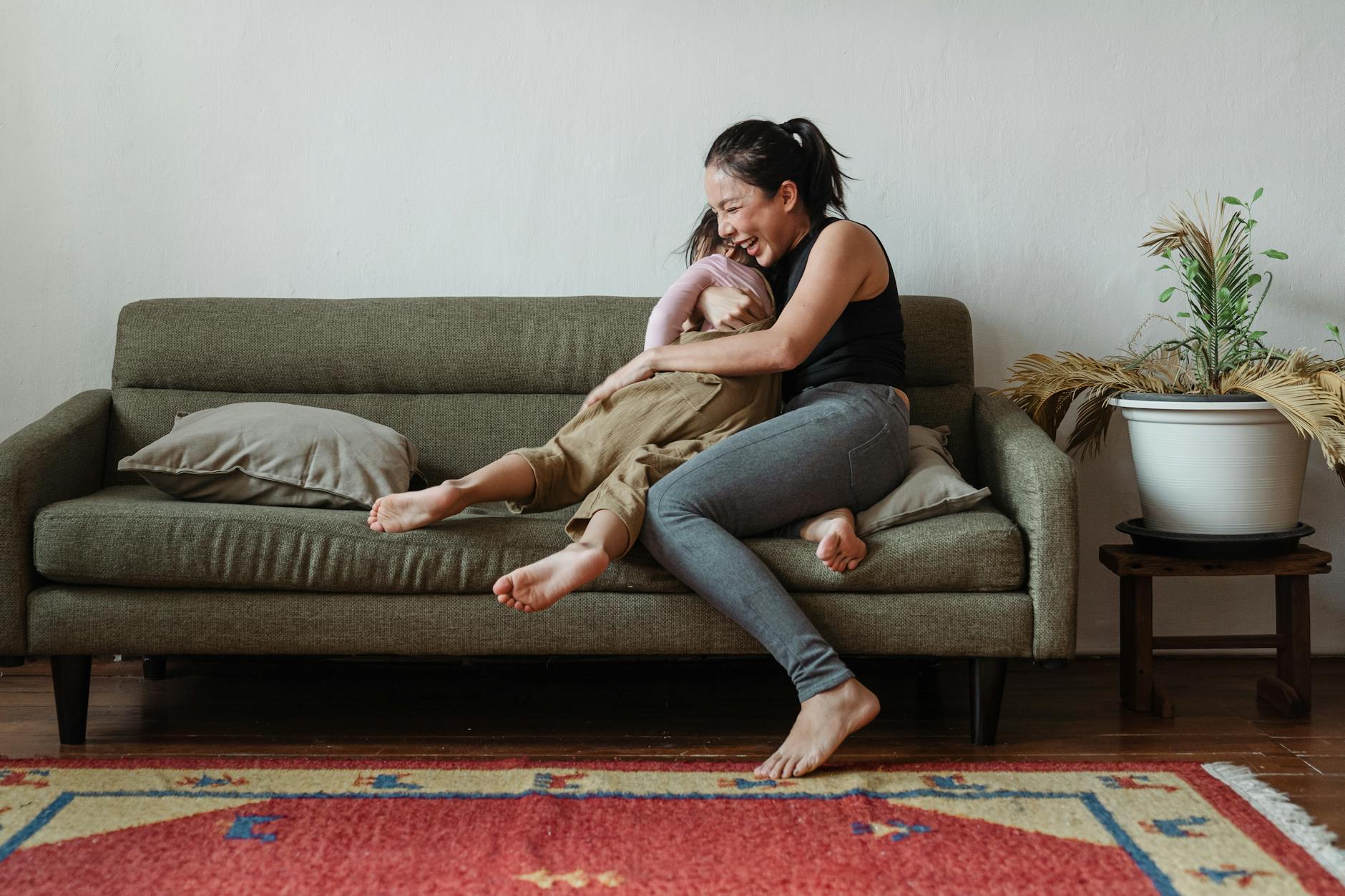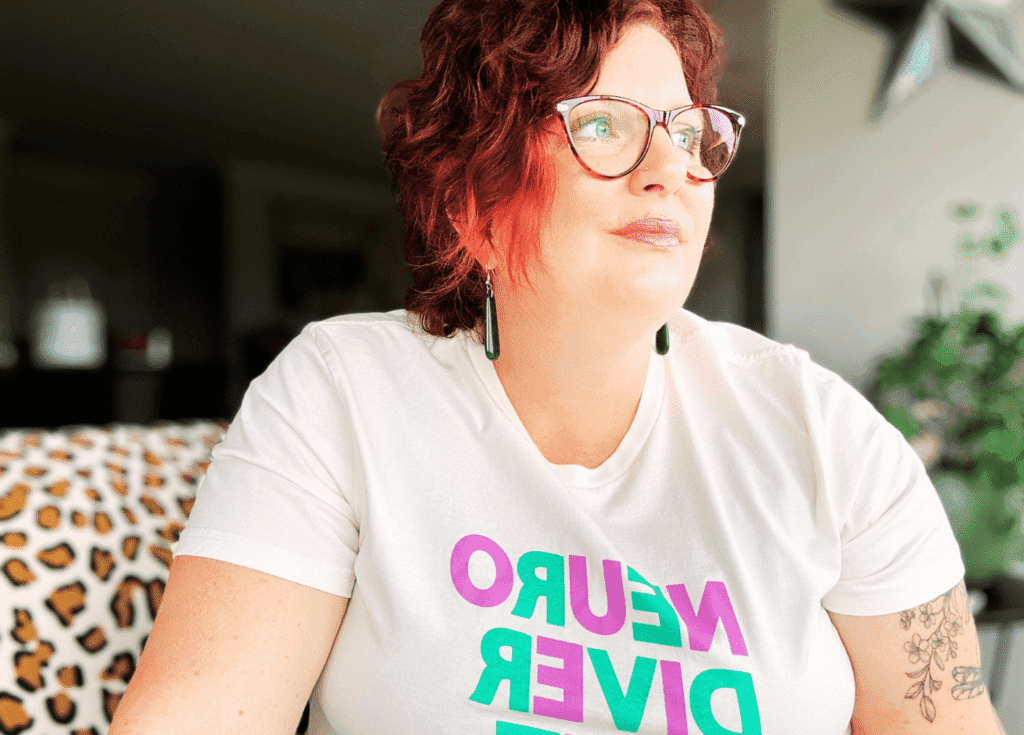The wayfinder’s guide for parents going off-grid from behaviourism, control, and inherited narratives
I have always enjoyed creating. Art, crafts, poetry and gardening have always been the way that I have enjoyed expressing myself and experiencing joy in the world.
The process is always the same, and if you’re an artist or a creative soul, you’ll understand this. We arrive at a project with an idea or even a plan of how it should look, how it should unfold, and then, somewhere along the way, the whole thing becomes a glorious, terrifying mess.

There’s that moment where you stare at what’s in front of you and think, “Oh no. This is not what I intended.“
But the real mastery lies in staying with it.
In letting the creation have its own life.
In surrendering to the co-creative process, with the creator, the muse, or the deeper knowing within you, and trusting that the mess is part of the making.
The Messy Art of Parenting
Parenting, especially parenting a neurodivergent child in burnout, is exactly like that.
We arrive with a blueprint handed to us by family, culture, schooling, psychology textbooks, and a long line of untold expectations and invisible rules.
We think we know how it is supposed to go…
However, as soon as we truly meet our child, their nervous system, their soul, their sensitivities, their limits, their wild and beautiful differences, everything we thought we knew can collapse into a pile on the floor.
And suddenly we’re standing in the mess, confused, disoriented, frustrated, and ‘shoulding’ ourselves, because this is not how it was supposed to go.
During this unexpected spiritual awakening, many of us call burnout, it can feel as though there is no clear way forward.
Our emotions suddenly feel more intense, and we start to see patterns of dysfunction from our culture, family and even our childhood that we just can’t unsee.
And in that moment, we are offered a choice:
Stay with the messiness of life as it is, nurture ourselves and our child through the discomfort of becoming…
Or retreat back to what we once knew.

For those of us who stay with the process, who breathe, who soften, who keep moving gently through the dark and winding path of the unknown, there comes a moment of realisation.
It was never the child who needed reshaping.
It was the narrative.
It was us.
The Unseen Forces That Make Parenting So Hard
Most modern parenting approaches, especially those still circulating in mainstream advice, were built on behaviourism, colonialism, and ableism.
Rewards, punishments, control, compliance, shaping behaviour, and extinguishing behaviour, not understanding the child, not connecting, not nervous system safety.
These “evidence-based” approaches were built on principles of behaviorism, a theory of learning that focuses on observable actions rather than non-observable mental states like feelings and thoughts and urges. Behaviorism privileges shaping behavior above understanding behavior. It sees behavior as the whole picture rather than an expression of underlying unmet needs.
Becky Kennedy, Good Inside: A Guide to Becoming the Parent You Want to Be
Parenting approaches that pull us further and further away from ourselves.
We’re taught to distrust our instincts and handed frameworks that convince us that if we just follow the steps, we’ll have control.
This legacy shapes everything:
- The way we judge ourselves, “Am I being too soft?”
- The way others judge us, “You just need to be firmer”
- Even the way we interpret our child’s distress, “They’re manipulating you”.
This behaviourist inheritance is the air we breathe, even when we don’t consciously believe it.

And then there is the deeper layer: what Don Miguel Ruiz calls domestication.
The lifelong taming of the spirit, training humans undergo to disconnect from their instincts, disconnect from their needs, and obey external rules in order to be “good,” “acceptable,” or “worthy.”
We were domesticated.
We were taught to override our bodies.
We were trained to obey before we were ever taught to listen.
We were shaped into versions of ourselves that fit the system, even when that shaping broke us.
Domestication is so strong that at a certain point in our lives we no longer need anyone to domesticate us. We don’t need Mom or Dad, the school or the church to domesticate us. We are so well trained that we are our own domesticator.
Don Miguel Ruiz – The Four Agreements
So when we now try to parent differently, especially in ways that align with connection, intuition, and neuro-affirming care, we are not just learning a new skill.
We are deconstructing a worldview.
We are unlearning our own domestication.
We are healing while parenting.
This is why it feels like a mess.
Because it is.
But it’s the sacred kind, the kind that precedes creation.
Why Changing Parenting Approaches Feels So Threatening
When parents begin lowering demands, following their child’s cues, building safety, or stepping away from punishment-based models, something huge happens internally:
Your nervous system screams, “This is unsafe.”
Not because the new way is wrong. But because the old way was familiar.

Even though a growing body of neuroscience shows that parenting approaches centred on control and compliance do not support healthy brain development or long-term wellbeing, letting go of the framework we were raised to trust and the illusion of control it offered can feel terrifying.
Most of us grew up with the authoritarian → authoritative → permissive triangle.
We were told:
- Authoritarian is too harsh
- Permissive is too soft
- Authoritative is the holy grail
But this entire model was built through a behaviourist lens that prioritised control, compliance, and hierarchy. This parenting model positions the parent as the unquestioned authority and the child as a wild, unreliable being who must be shaped into something acceptable.
We tell parents they must be ‘consistent,‘ that if they give an inch, their child will take the whole hand. That meeting a child’s needs is “giving in,” and responding with softness is laziness.
And the most damaging message of all, that if we don’t hold the line with absolute firmness, our children will be ruined and will never become acceptable or productive members of society.
It is the language of taming and shaping, not the language of partnership or nervous system attunement.
We face an impossible and life-threatening choice: lose yourself or lose your belonging.
Parenting Culture Change
So when parents today choose something different, something more relational, responsive, and neuro-affirming, it’s a bit like moving to a foreign country and deciding to learn the language through immersion.
Everything feels backwards at first.
The words don’t fit in your mouth.
Your instincts don’t match your new environment.
People around you think you’re strange.
You doubt yourself daily.
This is not failure.
This is acculturation.
This is de-domestication.
This is remembering who you were before the world told you who to be.
The Hidden Source of Parent Burnout
A significant portion of parent burnout does not come from parenting itself, but from the constant conflicts around parenting.
Parents burn out from:
- Defending their child to people who don’t understand
- Navigating systems built on compliance rather than connection
- Holding boundaries with family members who undermine them
- Battling internalised shame about being “too soft” or “not strict enough”
- The cognitive load of unlearning generations of conditioning
- Living in a world that gives parents responsibility but not support
- Trying to parent gently in a culture built on domination
Studies on parental burnout (Mikolajczak et al., 2018–2023) show that lack of social support, societal judgment, and misalignment with dominant parenting norms are some of the strongest predictors of burnout, often stronger than the actual demands of caring for children.
For parents of neurodivergent children, the burnout is multiplied:
- Constant advocacy
- Being disbelieved
- Navigating inaccessible systems
- Managing sensory and emotional environments
- Carrying the grief of watching your child suffer
- The ongoing work of building a world that fits them when the existing one doesn’t
Parenting is hard.
But parenting against culture is exhausting.
And parenting while healing from your own domestication, your own childhood, is revolutionary work.
You Are Not Failing — You Are Rewriting a Lineage
To parent differently, to choose connection over control, nervous system safety over obedience, partnership instead of hierarchy, is to disrupt generations of conditioning.
It is stepping out of a long line of “taming the spirit” and choosing instead to meet your child as a sovereign being.

It is to refuse the domestication you once endured, not just for yourself, but for your lineage.
This work doesn’t look neat.
It doesn’t look polished.
It often feels like a mess.
Just like every great creative process does in the middle.
But something extraordinary happens when we stay.
When we stay through the discomfort.
When we stay through the doubt.
When we stay even when the people around us don’t understand.
We reshape the story.
Not just for our children, but for every parent who comes after us.
Parenting differently is not permissive.
It is courageous.
It is culture-shifting.
It is soul work.
It is liberation work.
You are the first in your lineage to step out of domestication and into conscious, connected parenting.
Of course, it feels messy.
All revolutions do.
It’s Not Just You…
If you’re here, reading this, you already know that changing your parenting approach isn’t just about learning new strategies. It’s about unlearning generations of conditioning…
…untangling behaviourism from your instincts,
…quieting the voices of judgment around you,
…and rebuilding the trust you were taught to abandon.
This kind of transformation doesn’t happen in isolation.
It can’t.
Because the hardest part of parenting differently isn’t the child, it’s the culture we’re pushing against.
It’s holding your ground when others misinterpret what you’re doing.
It’s staying steady when your nervous system is screaming for the familiar, even when the familiar never truly fit.
It’s learning a new language of connection while the world keeps trying to drag you back into the old one.
And this is why community matters so deeply.
A community reminds you that you’re not imagining things.
That you’re not failing.
That you’re not alone in the messy middle.
It holds you through the doubts, the grief, the wobbles, and the wins.
It gives you a place to belong while you’re building a new way of being.
This is what From Burnout to Balance was created for.
A space where parents unlearning domestication and behaviourism can breathe, be understood, share the load, and find companionship on a path that can feel lonely and misunderstood in the outside world.
A place to rebuild your confidence, reconnect with your intuition, and restore your nervous system, all while raising your child in a way that honours their sovereignty and your own.
If you’re longing for support that sees beneath the surface,
that understands the hidden layers,
and that walks beside you as you rewrite your family’s story…
You’ll be held here.
We’d love to welcome you.
Have you enjoyed reading this blog? Subscribe and receive fresh reflections, parenting resources and validation every time I push publish.
The Person Who Wrote This Blog
Hi, I’m Tanya Valentin, an AuDHD parent, family coach, author, and podcaster. I guide parents of Autistic and ADHD kids through burnout recovery using a neuro-affirming, trauma-informed approach.
As a parent of three autistic teens, I know firsthand how isolating and exhausting this journey can be. If this spoke to something inside you, you’re not alone. You can find more reflections and gentle community-based support inside From Burnout to Balance.

